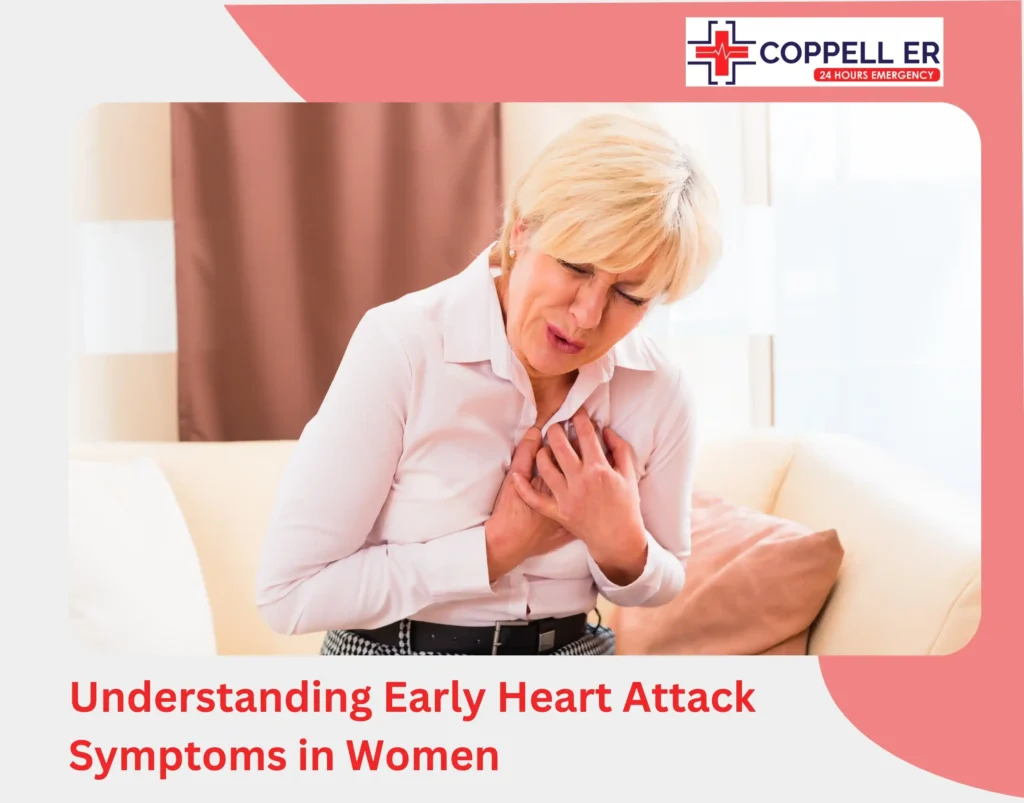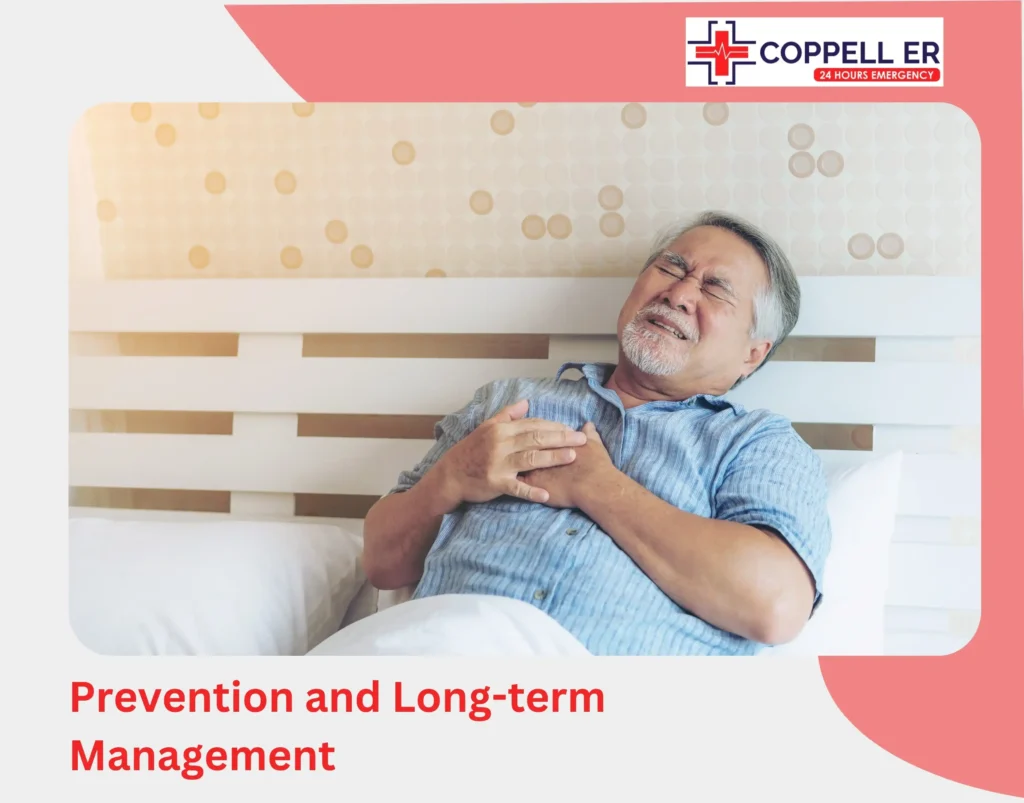Silent heart attacks in women often go unrecognized because they don’t follow the typical chest-clutching pattern most people expect. Instead, women experience fatigue, nausea, or shortness of breath; symptoms easily dismissed as stress or indigestion.
This lack of recognition proves dangerous. While women ignore subtle warning signs, their heart muscle suffers damage. Many don’t realize they’ve had a heart attack until it’s discovered during routine medical testing.
Emergency physicians see this regularly. Women arrive feeling “off” without realizing they’ve experienced cardiac damage. Quick recognition and treatment can prevent most of these complications.
Understanding Early Heart Attack Symptoms in Women

The early heart attack symptoms in women often differ from the classic chest pain most people expect. These subtle signs get mistaken for other conditions, leading to dangerous delays in treatment.
- Chest sensations in women may manifest as pressure, squeezing, fullness, or burning rather than sharp pain. Many women describe feeling like an elephant is sitting on their chest, or experiencing a tight band around their torso. These sensations may be mild, intermittent, or entirely absent during a cardiac event; making it difficult to distinguish chest pain from heart attack
- Upper body discomfort includes pain that may radiate to the shoulders, arms, back, neck, jaw, or upper stomach. This radiation pattern can be particularly confusing because the discomfort may be stronger in these areas than in the chest.
- Shortness of breath may occur with or without chest pain. Women describe feeling unable to catch their breath during normal activities.
- Gastrointestinal symptoms frequently accompany heart attacks in women, leading to misdiagnosis as stomach problems, food poisoning, or gastroesophageal reflux. Nausea, vomiting, and stomach pain can be the primary or only symptoms of a cardiac event, particularly chest pain after eating episodes that might indicate cardiac issues.
Recognizing Atypical Heart Attacks
Atypical heart attacks don’t follow the “standard” patterns often taught in medical training. These tend to affect women, older adults, and individuals with diabetes.
Common signs of atypical heart attacks include:
- Fatigue is one of the most commonly overlooked symptoms of atypical heart attacks in women. Many female patients report experiencing unusual, overwhelming tiredness in the days or weeks leading up to a cardiac event.
- Sleep disturbances and insomnia may signal an impending cardiac event in women. Many report difficulty falling asleep, staying asleep, or experiencing restless, unrefreshing sleep in the weeks before a heart attack.
- Dizziness and lightheadedness can indicate compromised blood flow during a cardiac event. The sensation may range from mild unsteadiness to severe vertigo that affects balance and coordination.
- Cold sweats and clamminess often accompany cardiac events in women, even when other symptoms are mild or absent. Many women describe breaking out in a cold sweat while experiencing other subtle cardiac symptoms.
- Mental fog and confusion can manifest during heart attack, particularly in older women. These cognitive symptoms may indicate compromised blood flow to the brain during heart attack. In severe cases, brain imaging may be needed to rule out stroke or other complications.
Risk Factors Specific to Women’s Cardiac Health
Women face unique heart attack risks that differ from men’s. Key factors include:
- Hormonal changes significantly impact cardiovascular risk. Estrogen protects the heart during reproductive years, but this protection drops during menopause. Blood pressure, cholesterol, and weight often increase during this transition.
- Pregnancy complications like preeclampsia, gestational diabetes, and high blood pressure increase lifetime heart disease risk. Women with these conditions should watch for cardiac symptoms throughout their lives.
- Autoimmune conditions such as rheumatoid arthritis, lupus, and inflammatory bowel disease disproportionately affect women. These create chronic inflammation that damages blood vessels and increases heart attack risk.
- Mental health factors including depression and chronic stress directly impact heart health. The relationship works both ways; each condition can worsen the other.
- Smoking can affect women differently than men. Some studies suggest female smokers may face additional challenges in quitting. Secondhand smoke exposure during pregnancy and menopause also pose particular risks.
Prevention and Long-term Management

Preventing silent heart attacks in women involves both general cardiovascular health and women-specific factors.
- Regular cardiovascular screening becomes more important with age, especially after menopause. This includes blood pressure checks, cholesterol testing, and discussions about family history and personal risk factors.
- Physical activity can benefit heart health. Many health organizations recommend at least 150 minutes of moderate exercise weekly, though individual needs vary. Combining cardiovascular and strength activities may provide additional benefits.
- Heart-healthy eating patterns like the Mediterranean diet – emphasizing fruits, vegetables, whole grains, lean proteins, and healthy fats – have shown positive effects on cardiovascular health in some studies.
- Stress management through meditation, yoga, or other relaxation techniques may help support heart health, though individual responses vary.
- Know your risk factors and discuss them with your healthcare provider, especially if you have a family history of heart disease, pregnancy complications, or autoimmune conditions.
Why Early Recognition Saves Lives
Early recognition of silent heart attacks in women saves lives because treatments work best within hours of symptom onset. Clot-busting medications and emergency procedures like angioplasty lose effectiveness as time passes.
Women face unique diagnostic challenges. Standard tests may miss subtle symptoms, and healthcare providers sometimes misinterpret vague complaints as stress or anxiety.
Missed heart attacks create serious long-term risks. Delayed treatment can significantly increase chances of heart failure, dangerous heart rhythms, and sudden cardiac death.
When to Seek Emergency Care

When something feels wrong, trust your instincts. At Coppell Emergency Room, we use ECGs, cardiac enzymes, and advanced diagnostics to identify silent heart attacks in women that others might miss.
Don’t wait for classic chest pain. Unusual fatigue, persistent nausea, or unexplained shortness of breath deserve immediate evaluation.
FAQs
1. Can you live a normal life after a silent heart attack?
Yes, Many people live normally after silent heart attacks with proper medical care, lifestyle changes, and ongoing monitoring to prevent future cardiac events.
2. Why do I keep thinking I’m having a heart attack?
Anxiety and panic attacks can mimic heart attack symptoms like chest tightness and shortness of breath. Since women’s heart attack symptoms are often subtle, medical evaluation is necessary to distinguish anxiety from cardiac issues.
3. Can ECG detect silent heart attacks?
ECGs can sometimes reveal past silent heart attacks if they caused lasting heart damage. Blood tests and imaging may also help identify previous unrecognized cardiac events.
4. How to check heart blockage at home?
You cannot definitively check for heart blockage at home. Fitness trackers monitor heart rate but cannot detect artery blockages or silent heart attacks. Clinical testing is required.
5. What are the first signs of a weak heart in women?
Fatigue, shortness of breath, and swelling may indicate a weak heart. These symptoms often overlap with early heart attack signs, and may even signal atypical heart attacks.
6. What is often mistaken for a heart attack?
Heartburn, indigestion, muscle pain, and anxiety can feel like early heart attack symptoms. In women, these mild signs may actually be silent heart attacks or atypical heart attacks, which makes accurate diagnosis critical for protecting cardiac health.
7. Can overthinking cause a heart attack?
Stress alone doesn’t cause heart attacks, but chronic stress may contribute to heart disease by raising blood pressure and inflammation levels.




